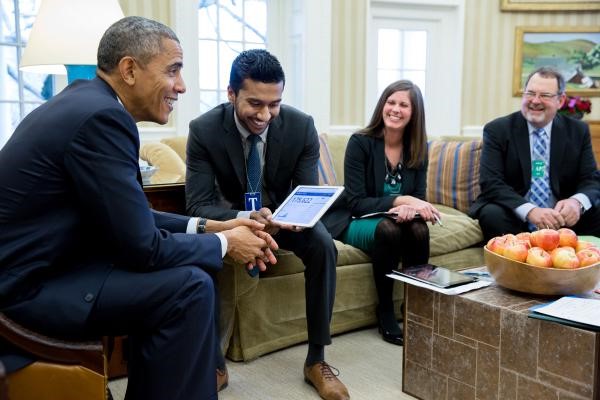
Today, students are able to compare the cost of college with other significant data points, such as graduation rates and average salaries of graduates to determine where to get the most bang for their buck. Communities can finally map demographic, income, and school data to promote Fair Housing. Patients can find information on the safety and cost of hospitals, nursing homes, and physicians, empowering them to make smarter health care choices. These diverse tools benefit different groups of people, industries, and communities, yet all rely on one thing: open data.
Open data from the U.S. Government is an important national resource, serving as fuel for innovation and scientific discovery. It is central to a more efficient, transparent, and collaborative democracy. Since President Obama’s first day in office, his commitment to ensuring all Americans reap the benefits of public open data has been unwavering. Throughout the Administration, the U.S. Government has implemented policies to open its data, including:
- Presidential Memorandum on “Transparency and Open Government”
- Open Government Directive
- Executive Order 13642 “Making Open and Machine Readable the New Default for Government Information”
- OMB Memorandum M-13-13: “Open Data Policy—Managing Information as an Asset.”
2015 was a year of great advancement in open data initiatives. Progress on Project Open Data has been growing each year, and is expected to continue as the Administration continues to prioritize open data because of the value returned to society. Federal agencies continue to release and improve their open data for more citizens, non-profits, and companies. You can see how agencies are doing over time, with quarterly evaluations by agency on the Project Open Data Dashboard.
As we look towards the work to be done in 2016, we also celebrate open data milestones and successes over the past year:
- Chief Data Roles. Central to a data-driven government is committed leadership dedicated to data improvements and comprehensive information management. In 2015 the White House welcomed the first-ever U.S. Chief Data Scientist and Deputy Chief Technology Officer for Data Policy, DJ Patil. In 2015, several Federal Agencies, including the Department of Commerce, the Environmental Protection Agency, and General Services Administration, followed suit, adding Chief Data Officers and Chief Data Scientists to their rosters.
- Open Data Making a Difference. Open data was a key ingredient to addressing pressing policy issues in 2015, including: helping students and families better evaluate college choices with a new College Scorecard; making it easier for communities to implement the Fair Housing Act with the Affirmatively Furthering Fair Housing Assessment Tool; and enhancing trust between communities and law enforcement with the White House Police Data Initiative.
- Open Data Updates and Improvements. 2015 also saw many expansions on pivotal open governmental datasets, such as: new U.S. Extractive Industries Transparency Initiative federal production and federal revenue by company data; new Consumer Financial Protection Bureau Consumer Complaint Database tools (API); and various OpenFDA updates, including direct downloads that enable citizens to use data on food, drug, and medical device safety. The Federal Government also provided new platforms for exploring government data, including: Open.nasa.gov, USPTO’s PatentsView, and Landsat on AWS.

- Website Dashboards. Last year two new dashboards were also created to better evaluate the health of our Federal government websites: Analytics.usa.gov tracks how people are interacting with the government online and Pulse.cio.gov helps the government and public observe progress on HTTPS and Web Analytics.
- Public Engagement around Open Data. Federal agencies featured open data efforts at dozens of hackathons, data jams, and conferences including the 2015 Health Datapalooza, Transportation Datapalooza, Third Annual Safety Datapalooza, Mental Health Hackathons, an Accessibility Hackathon, a White House Mapathon, and eight Open Data Roundtables.
One common denominator of these successes is that open data is a collaborative process, involving Federal government, state and local governments, academia, private sectors, and civil society. It takes a village to transform open data into actionable knowledge and societal value. Like data science, open data is a team sport, united by the shared purpose to responsibly unleash the power of data for the benefit of the American public and maximize the nation’s return on its investment in data. Together in 2016 and beyond, “Team Open Data” will continue transforming open data into knowledge, into action.

Open data remains a priority in 2016, offering both government and citizens information to make better decisions and a way for Americans to interact with their government. For upcoming events related to open data, please check out the Data.gov/events calendar.
Kristen Honey is a Policy Advisor at the White House Office of Science and Technology Policy.

